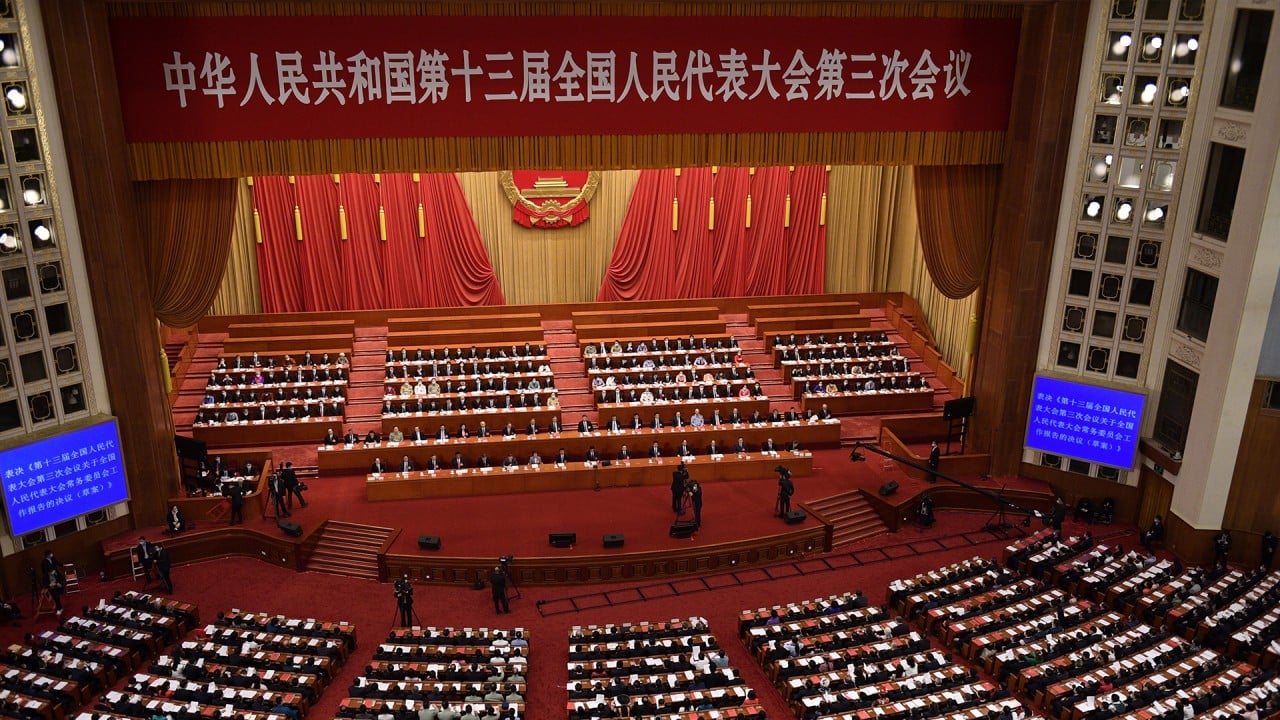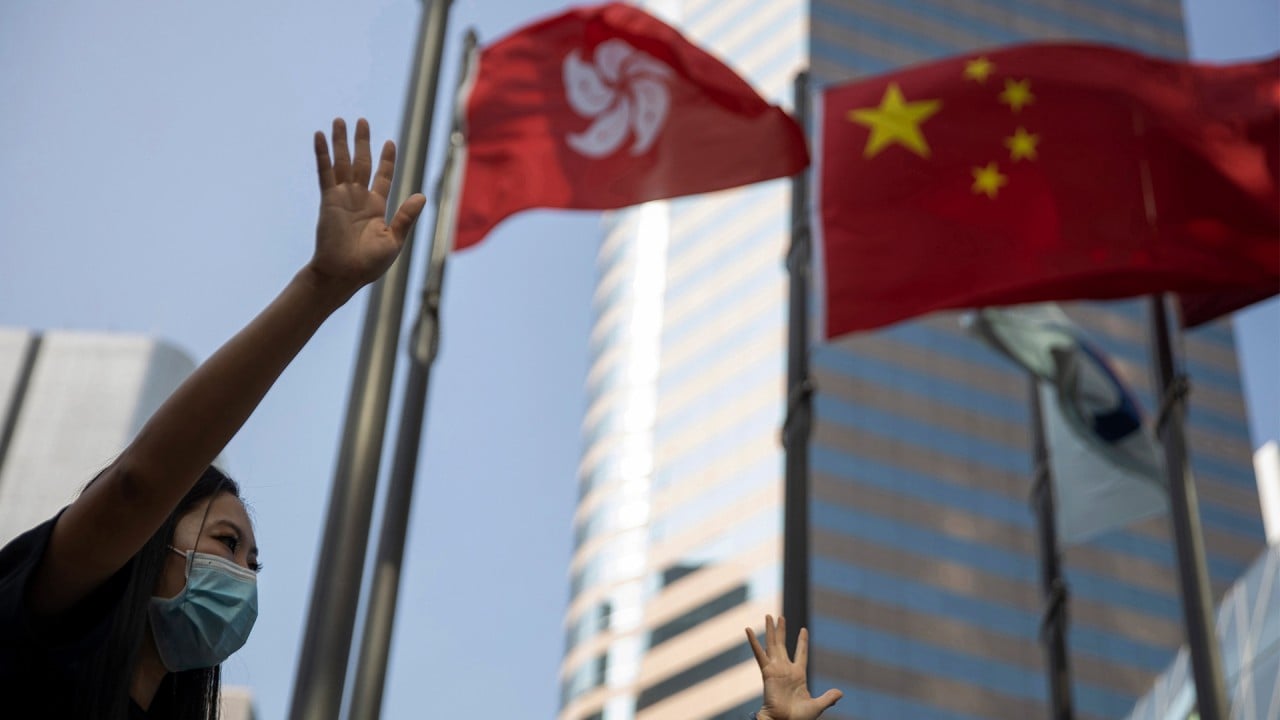Hong Kong security law: city’s future is in servicing Chinese firms, says top city economist
- Prominent Hong Kong economist Francis Lui Ting-ming says overall impact of security legislation on Hong Kong will be positive and bring stability
- Lui says the city’s trusted financial system has allowed Beijing to allocate capital more efficiently and that role had made it indispensable to China

Hong Kong’s economic role has been gradually shifting towards serving mainland firms in a way that will eventually make the city indispensable to Beijing, one of the city’s most prominent economists said, as China moved a step closer to imposing a new security law on the financial hub.
China’s parliament on Thursday endorsed a resolution authorising the legislation just hours after US Secretary of State Mike Pompeo said the city is no longer suitably autonomous from China.
There are fears the Trump administration could, among other measures, revoke the city’s special trading status, potentially throwing Hong Kong’s future as an international commercial centre into doubt.
Francis Lui Ting-ming, a professor at Hong Kong University of Science, said Hong Kong would never be able to become a top financial centre like London for international foreign exchange and bond trading, or banking and insurance services.
Instead, it could build on its trusted financial system that has proved crucial in enabling Beijing to allocate capital more efficiently, and helped mainland firms, he said.
“A lot of capital flows from China into Hong Kong, and then flows back to China, making a circle of funding. This is the role that Hong Kong plays,” said Lui, who is also a regular government adviser. “Hong Kong people need to see what kind of bargaining power they have with China.”
Data from Morgan Stanley showed that 27 per cent of Chinese companies used Hong Kong for their initial public offerings between 2015 and 2019, compared to 7 per cent that listed in the United States.
Since 1998, an annual average of 30 per cent of foreign direct investment flowing into Hong Kong came from mainland China, according to the city’s Census and Statistics Department. The latest data from 2018 showed mainland investment in the city stood at HK$296 billion (US$38.1 billion), about 36 per cent of total capital inflows.
While the size of Hong Kong’s economy compared to that of mainland China has declined from 16 per cent in 1997 to 3 per cent in 2018, analysts said a narrow comparison focusing on gross domestic product masks the city’s financial relevance.

02:33
China’s top legislature approves national security bill for Hong Kong
Hong Kong’s role as an offshore financial centre helps facilitate China’s access to US dollar-denominated debt borrowing, as well as to foreign investment because the mainland maintains a relatively closed capital account restricting capital flows.
The city can continue to serve as a gateway to multinational companies by attracting foreign investment into China, as the national security legislation was more benign than that used in other Chinese business hubs and unlikely to scare off investors, Lui said.
Lui said the overall impact of the legislation on Hong Kong would be positive because increased law enforcement was required to maintain stability.
China’s assessment of the introduction of Hong Kong’s national security law is that it will have little impact on the city’s economy
“China’s assessment of the introduction of Hong Kong’s national security law is that it will have little impact on the city’s economy,” Lui said. “As long as Hong Kong does not return to stability, [China] will not stop what it is doing.”
In March, Hong Kong lost its top ranking as the world’s freest economy, which it had held for the previous 25 consecutive years, slipping to second place behind Singapore, according to the Heritage Foundation.
The Washington-based think tank cited political and social turmoil in the city as eroding its business reputation.
The national security legislation endorsed by China’s National People’s Congress on Thursday is aimed at tackling secession, subversion, terrorism and foreign interference in the city, which was roiled by months of anti-government protests last year.
Under the law, the Hong Kong government will be required to set up new institutions to safeguard sovereignty, while allowing mainland agencies to operate in the city as needed. The law was amended on Tuesday, expanding its scope to prohibit activities that would “seriously endanger national security”.

01:56
Hong Kong is no longer autonomous from China, US determines
If the US suspends its special treatment of Hong Kong, it could open the door to restrictions on trade, visas and technology, and be a huge vote of no confidence in the city.
Joseph Yam Chi-kwong, an executive council member and former Hong Kong Monetary Authority chief, said if Chinese companies were banned from raising money in America, it would encourage more US-listed tech companies to list in Hong Kong, while pushing China to further internationalise the yuan.
“If these things happen, it will further strengthen Hong Kong’s role as an international financial centre,” Yam said.
But others remain worried that escalating tensions between China and the US will continue to erode Hong Kong’s standing as a business hub.
Additional reporting from Enoch Yiu
Help us understand what you are interested in so that we can improve SCMP and provide a better experience for you. We would like to invite you to take this five-minute survey on how you engage with SCMP and the news.